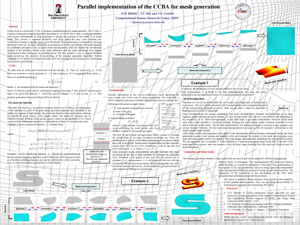 |
||||||||
 |
 |
 |
 |
 |
| Parallel Implementation of the CCBA for Mesh Generation | ||
|
In this work we extend the CCBA to produce a
parallel-iteratively mesh generator. The CCBA or Convex-Combination-Based-Algorithm
(presented in ACSESS 2007) uses a mesh-size function and convex
combinations on local polytopes to change the position of the nodes
of an initial mesh. This process is repeated iteratively and stops
when the max norm between two consecutives meshes is smaller than
a given threshold. The parallelization is obtained by dividing the
initial mesh into as many submeshes as processors available and
dealing with each submesh in a different processor. This so-called
mesh decomposition does not depend on the physical domain of the
problem, which is the main difference and the main advantage over
domain decomposition-like techniques for parallelization. We also
present a way to reduce overhead while preserving the property of
non-folding of the original sequential algorithm. Several examples
of 2D meshes on complex domains show the potential of the technique
for constructing non-uniform quad meshes.
| ||
| • Other Abstracts • | ||
